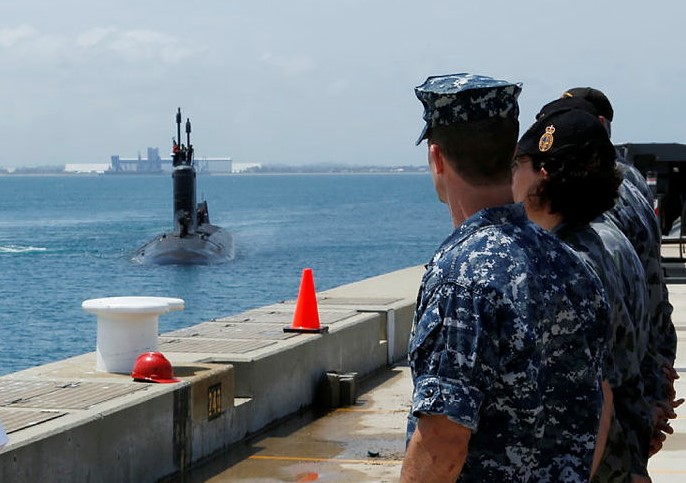The AUKUS debate Australia needs to have

The government confirmed last week that selected Royal Australian Navy surface ships and submarines will in the foreseeable future be equipped with US long-range Tomahawk cruise missiles. This is a spectacular development in Australia’s military posture but one rendered almost ho-hum by the AUKUS package on nuclear-powered submarines announced just days earlier.
The RAN’s first Virginia-class SSN is expected to be in the water by the mid-2030s and the first boat with a significant ‘made in Australia’ character nearly a decade after that. That is a very long time to sustain the attitudes that drove the trilateral decision to go down this path. It will seem even longer because all sorts of commentators coming from every imaginable direction will be giving the issue a real workout. Some will be seeking to defend and protect the program, others to see it discredited and abandoned, and still others to simply try to explain and understand it.
Australia has, of course, looked at nuclear-powered submarines in the past and elected not to try to acquire them. In the past, the primary question was framed in terms of what Australia would need to do to make the construction of such vessels a practical next step. The option was deemed unattractive for several reasons. First, it would take a long time, decades, for Australia to acquire the necessary competencies, not least the nuclear skills associated with the propulsion units. Second, the nuclear skills needed would almost certainly see Australia put on a proliferation watch list—that is, a state moving significantly closer to the capability to support a nuclear-weapon program. A third consideration would have been the daunting cost.
The AUKUS submarine package allows Australia to credibly deny an interest in acquiring nuclear weapons, but it doesn’t soften the other two negatives—the long acquisition timeframe and the cost.
The principal themes of the commentary alluded to above, certain to be a sustained deluge, can be readily anticipated. One major theme will be misjudgement—that one side overreacted to events and developments or foolishly seized on a military response to changes better dealt with in other ways. Other likely variations on this theme include that the misjudgement stemmed from a single or small number of major events, resulted from a perceived relentless accumulation of events, or ultimately arose from an excessive rigidity and an unwillingness to consider adapting the region to geopolitical changes.
The flip side of the misjudgement theme is likely to be the contention that authoritarian states have a new and still growing weight in the international system that amplifies the significance of the stark imbalance in natural flows of information and knowledge between these states and the community of democratic states. Moreover, that asymmetry involves those authoritarian states having, at best, limited internal checks and balances, as well as a range of options on policy and practices that democracies cannot match and have great difficulty countering.
Is Australia ready for this deluge of commentary, assessment and judgement? I don’t think so. My feeling is that many Australians still sense a significant disconnect between what has happened, predominantly but not exclusively in the Indo-Pacific, over the past decade or so and Australia’s commitment to acquire a fleet of nuclear-powered submarines, a capability completely out of our reach at the present moment.
To take us through this storm of judgement, Australians need a compelling and stable narrative that accounts for the course the government has elected to take. This narrative must be honest—any untruths or convenient exaggerations are sure to be exposed by the passage of time. It also needs to be edgy in the sense of clearly being informed by what the intelligence agencies were telling the government along the way. That will involve thoughtful judgements weighing up protecting intelligence sources and methods and imparting the narrative with the gravitas it will need to accomplish its objectives. I have touched on some of these aspects of the AUKUS decision in earlier Strategist posts.
Equipped with its AUKUS narrative, and neither emboldened by nor apologetic about it, Australia should aspire to be a robust participant in the many dialogues that lie ahead on the security architecture needed in the Indo-Pacific to ensure that we can collectively navigate the turbulence ahead without major conflict. We may well discover, as an Indo-Pacific community, that no one has a monopoly on misjudging the reactions to and therefore the consequences of particular policy settings. As time passes, it will get harder to alter the primary components of the SSN AUKUS project. But it’s not that hard to imagine developments that would incline a future Australian government to see merit in making some adjustments to facilitate or respond to regional developments.
